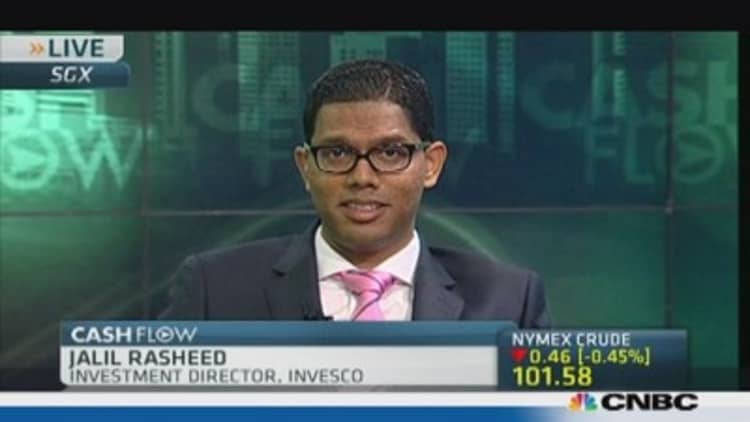U.S.investors piled into emerging Asian exchange traded funds (ETFs) this week as the government shutdown moved into its third day.
According to trading firm IG, the Ishares MSCI Philippines Investable Index has rallied over 2 percent this week, while the corresponding Indonesian and Indian MSCI ETF indices jumped 1.5 percent and nearly 1 percent respectively. The MSCI Emerging Market index, meanwhile, has gained nearly 0.7 percent this week.
"Investors put aside the implications of the shutdown and bet on emerging Asian markets as they see the effect of [the shutdown] as contained," said Kelly Teoh, market strategist at IG's Singapore office.
(Read More: Emerging market 'multi-week rally' may loom)
Washington was officially shut down for the first time in 17 years on Tuesday after Democrats and Republicans failed to reach an agreement on renewing the federal budget into the new year.
Markets have given a relatively muted reaction to news of the shutdown. On Wednesday, Wall Street closed slightly lower, while Japan's Nikkei 225 was trading flat by lunchtime in Asian trading on Thursday.
(Read More: Emergingmarkets party as Fed stays put)
According to Ross Teverson, investment director of global emerging markets at Standard Life Investments, concerns over the impact of the shutdown were not being felt in the emerging market region.
"I don't think the shutdown in the U.S. is really that significant for emerging markets. We've seen this before and it will be resolved," he said, adding that he doubted fears of another political stalemate over raising the debt ceiling would cause problems for the region.
"[The debt ceiling] could be a big deal, but I would expect that to be resolved as well... It's important for investors to look through the short-term noise and recognize that a lot of the concerns people have are already reflected in emerging market share prices," he added.

Teverson remained bullish on emerging markets in the long term, despite the vicious pummeling they received amid the Federal Reserve tapering fallout. The MSCI Emerging Markets index fell over 16 percent from late May to late June, but has since gradually recouped around 14.5 percent.
"People often think tapering is a negative for emerging markets, and certainly it has resulted in some negative fund flows out of the region this year. But we also need to look at why we are having this conversation about tapering. It's because prospects for the U.S. are better... and that's obviously good for emerging market exporters," he added.
(Read More: Emerging market rout? That was so 3 weeks ago)
On top of the surge in appetite for emerging Asian ETFs this week, IG's Teoh pointed out that emerging Asia's equities outperformed the S&P 500 in September.
In contrast to the S&P 500's mere 3 percent gain over the month, Indonesia's benchmark stock market – the Jakarta Composite – jumped 9 percent, recovering from heavy losses during the tapering fallout. Meanwhile, Thai stocks rose 7 percent, while India's Nifty gained 5 percent.
"Emerging Asian markets' price-to-earnings multiples have increased since the markets have recovered, except for Chinese stocks. The rest are trading close to their five-year averages," said Teoh.
(Watch This: Chartsshow why markets shrugged off shutdown)
Furthermore, Mark Matthews, head of research for Asia at Julius Baer told CNBC on Thursday he had also seen fresh appetite for the region.
"What we've noticed in fund flows… in the last couple of weeks [we've seen] some reallocation back into Asia," he said.
However,despite the better performance from emerging markets in recent times, IG's Teoh warned that the longer the U.S. government shutdown lasts, the broader the implications will be for global growth.
"While the bickering in Congress continues and does not appear to be coming to a conclusion any time soon, this uncertainty will put pressure on global markets... Investors are coming to the realization that this shutdown might go on longer than expected," she added.
—By CNBC's Katie Holliday: Follow her onTwitter @hollidaykatie


